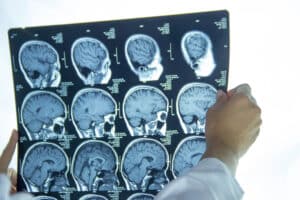
There are two sub-types of brain injury: open and closed. Both can be devastating and leave the victim suffering significant impairments. In general, the brain injury from an open wound tends to be more localized than the diffuse injury often associated with a closed-head injury.
Open Traumatic Brain Injuries
Open traumatic brain injuries occur when the scalp suffers lacerations or there are fractures in the skull. These are sometimes known as penetrating head wounds since they penetrate the scalp or skull. Common causes of open head injuries include:
- Gunshots, stabbings, and other violent acts
- Car accident injuries
- Other types of high-speed accidents
Penetrating brain injuries primarily affect the area where the object—often a part of the skull—enters the brain. For example, in a hunting accident, one man shoots another in the right side of the head. The damage will occur where the bullet entered the brain and along the path it traveled. This causes localized damage but may not affect the rest of the brain unless swelling or other complications occur.
Open head wounds often lead to what is sometimes known as focal damage. The symptoms and lasting effects of a focal brain injury vary widely depending on the areas of the brain affected. The damage will be focused only on the parts directly affected by the penetrating object.
Closed Traumatic Brain Injuries
Closed traumatic brain injuries occur when the head hits something or whips back and forth and causes the brain to bounce inside the skull. The skull is not fractured or penetrated in a closed brain injury. Closed head injuries commonly occur during:
- Car accidents
- Assaults
- Sports collisions and other accidents
- Falls
Both concussions and diffuse axonal injuries are types of closed head traumatic brain injuries. While closed TBIs can vary widely in severity, the damage caused tends to be more widespread than in an open TBI.
Treatment and Rehabilitation After a Brain Injury
Both sub-types of brain injuries can leave victims with significant impairments. Some people heal quickly from relatively minor concussions and return to work within a few days. Others are never able to return to work and require ongoing care for the rest of their lives.
For moderate or severe TBIs, the doctor will almost always prescribe therapy. Depending on your specific needs and deficits, this can help you:
- Rebuild strength
- Overcome impairments
- Relearn skills
- Learn to work around new handicaps
- Take care of your own activities of daily living
- Regain job and life skills
- Regain mobility and independence
The types of therapies required will vary based on the areas of the brain affected, but may include:
- Physical therapy
- Speech therapy
- Cognitive therapy
- Occupational therapy
It is impossible to know how much you may recover, or if you will recover fully before you complete therapy and work with your doctor and others to rehabilitate your physical and cognitive abilities. Traumatic brain injuries can be unpredictable, especially when they affect diffuse areas of the brain as closed head wounds often do.
Pursue Compensation for Your Brain Injury
If your brain injury occurred because of someone else’s negligence, you may be eligible to file an insurance claim or personal injury lawsuit. You could qualify to recover damages including your expenses and losses related to your accident and injuries.
The team from Newsome | Melton has more than two decades of experience fighting to protect the rights of personal injury accident victims. We can evaluate the circumstances of your accident and determine your legal options. Our brain injury lawyers will help you pursue the compensation you deserve. We can:
- Identify any potentially liable parties
- Investigate your case
- Collect evidence to prove negligence and liability
- Build a strong case to pursue compensation
- Negotiate an out-of-court settlement or file a civil suit and litigate your case
Call the Newsome | Melton team today at (800) 917-5888 for your free case review.
